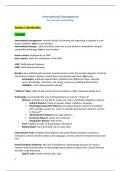International Management
Key Concepts and Readings
Session 1 Introduction
Concepts
International management: internal activity of planning and organizing a company’s cross-
border activities, why to cross borders.
International strategy : external activity, decisions to stay ahead of competition and gain
competitive advantage, how to cross borders.
Home country: headquarter of MNC.
Host country: hosts the subsidiaries of the MNC
MNC: Multinational Company
MNE: Multinational Enterprise
Borders: have political and economic importance but create also mental categories of formal
and informal systems. Border-crossing firms need to deal with these differences.
- Advantages: arbitrage opportunities, profiting from differences (laws, diversity,
prices, knowledge, customers, cost saving, resources, avoiding trade barriers)
- Liabilities: cost of doing business abroad.
“Made In” label: refers to the country where a product is made. Expresses quality level
Technology: has impacted the way of doing business on society in terms of:
- Distance: activities are not tied to a place (ex: Zoom, worldwide shipping). Leads to:
Cultural distance: based on people, habits, traditions, language, …
Psychological (psychic) distance: perceptual distance, based on familiarity
with a foreign country. Ex: “have we already done business with this country
in the past?”
Administrative distance: tax, legal systems,…
Economic distance: prices and currencies
Geographic distance: time zones,…
- Time: traditional order of doing things is disrupted
- Relationships: firms do heavily rely on each other
International Trade: amplifies when physical and social distance between countries is
facilitated: common border, harbor, same language, currency. Shorter transport means lower
cost.
Dumb Foreigner Syndrome: the cost of foreignness: disadvantage because of a lack of
network, bad communication, no knowledge about implicit societal rules. Cultural frictions
are often underestimated.
- Explicit rules: written formal rules, laws.
1
, - Implicit rules: have a social character and influence relationships.
Internalization: producing good of services in-house, mostly key-assets that should be
shielded form competition.
Session 2 Globalization
Concepts
Globalization: growing economic interdependence between countries through increasing
cross-border transactions. Melting of individual societies and cultures to one whole
ensemble. Lower tariffs and higher global prosperity.
Deglobalization: form of protectionism, nationalism, powerful nation states, local solutions
and border control. Reasons:
- Climate change: “buy local”
- Exploitation
- Economic inequality
- Fear of immigration
- Shift in world power, rise of China.
View on deglobalization: two different schools of thoughts:
- Liberalism: globalization in the form of sectors, multiple patches of openness. Stands
for globalization patchwork.
- Realism: each country on its own. Stands for blocks around each state.
Paradox: politics push us apart, whilst technology brings us together. International managers
must be able to navigate between these forces.
International manager must:
- Be able to adapt performance and behavior.
- Adapt to cultures.
- Understand change in settings.
De facto: what really happens, observation of effective changes by measuring facts.
De Jure: what happens stated by the rules, what should happen.
Greenfield investment: investment from scratch.
2




